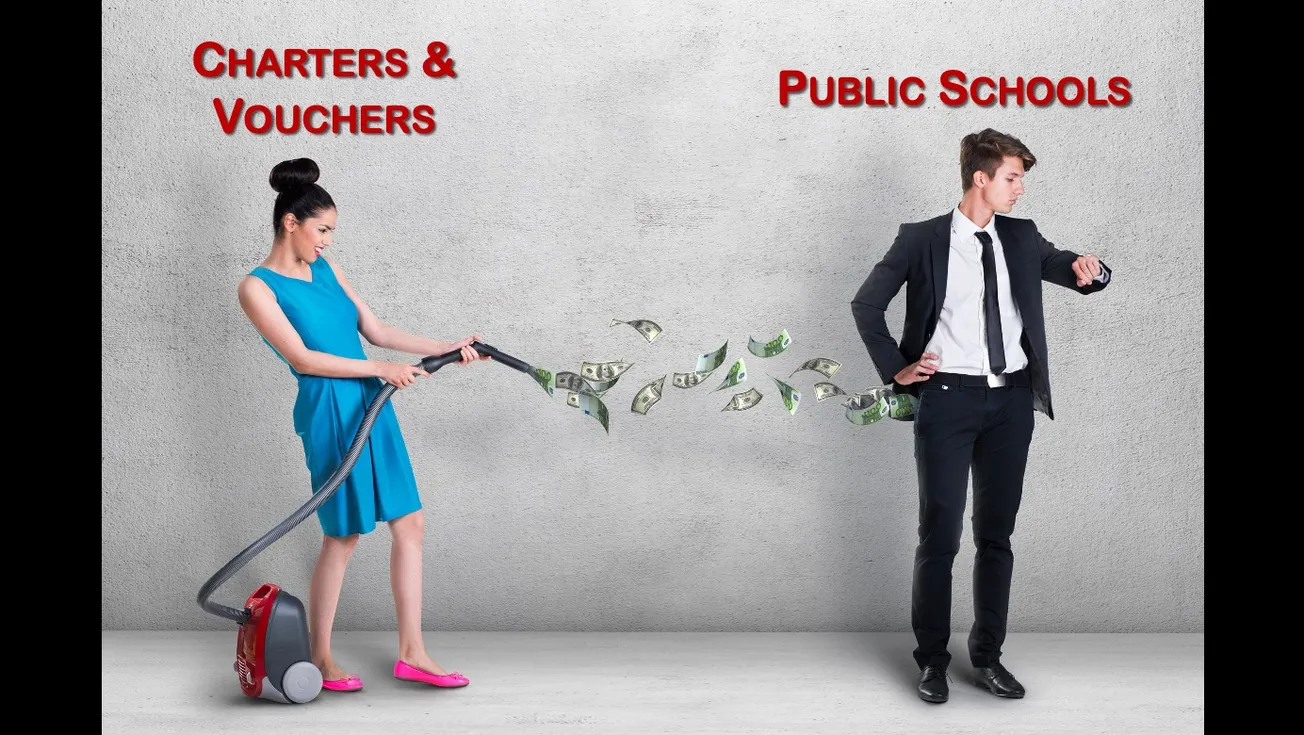Speaking against Amendment 2 on the stump at the Fancy Farm picnic, state Rep. Cherlynn Stevenson (D-Lexington) dismissed the measure as “just the latest example of Republicans trying to shove their unpopular and unconstitutional schemes down Kentuckians’ throats.”
The amendment, which will be on the ballot Nov. 5, would change the state constitution to permit the General Assembly to pass laws letting tax dollars go to public schools. GOP supermajorities in both houses passed legislation calling for the amendment. Gov. Andy Beshear opposes Amendment 2, but amendment legislation doesn’t need a governor’s signature to be placed on the ballot.
The Amendment 2 ballot question doesn’t spell out how the legislature might approve the use of public funds for private schools. Here’s how it will appear on the ballot:
To give parents choices in educational opportunities for their children, are you in favor of enabling the General Assembly to provide financial support for the education costs of students in kindergarten through 12th grade who are outside the system of common (public) schools by amending the Constitution of Kentucky as stated below?
IT IS PROPOSED THAT A NEW SECTION BE ADDED TO THE CONSTITUTION OF KENTUCKY TO READ AS FOLLOWS:
The General Assembly may provide financial support for the education of students outside the system of common schools. The General Assembly may exercise this authority by law, Sections 59, 60, 171, 183, 184, 186, and 189 of this Constitution notwithstanding.
Critics say the wording is deliberately vague. But it’s a safe bet Republican lawmakers will approve a voucher program under which parents or guardians can use tax dollars to send their children to private schools.
Project 2025, the Heritage Foundation's blueprint for a second Donald Trump term, calls for vouchers. A report by the Kentucky Center for Economic Policy, a think tank, estimates “a program proportional to what Florida, the largest state Program, has in place would cost $1.19 billion annually from the Kentucky state budget. That equals the cost of employing 9,869 Kentucky public school teachers and employees.”
The idea of vouchers, of course, is to weaken public schools.
“Here in the state of Kentucky, 90 percent of the school age children attend a public school,” said Eddie Campbell, president of the Kentucky Education Association. “Instead of focusing on our teacher shortage, our support professional shortage, our bus driver shortage, and supporting our public schools, we have a constitutional amendment that would take public dollars and send them away to unaccountable private schools.” Campbell added that public schools “have to account for every dollar that comes in.”
Proponents of Amendment 2 insist their aim is “school choice,” a term that’s been bandied in rightwing circles for some time. “School choice” is a euphemism for vouchers. The Arizona Center for Investigative Reporting quoted from Project 2025, which says pushing vouchers is “a goal all conservatives and conservative Presidents must pursue” because “every parent should have the option to direct his or her child’s share of education funding through an education savings account (ESA), funded overwhelmingly by state and local taxpayers. [italics mine]”
GOP candidates “talk about ‘school choice’ and putting God and prayer back in schools,” Brynn Tannehill wrote in the New Republic two years ago. “What they really want, though, will result in the end of public education for the poor, and disfavored minorities like LGBT people.”
That’s still true.
She explained that with a “school choice” system, “parents are given a voucher for several thousand dollars that comes out of the state education budget. The money can be spent on tuition for charter or private schools, microschools (collective homeschooling), or regular homeschooling. Republicans say the ‘money goes to the kids.’ In reality, it reduces money going to public schools to a point where the schools will be dramatically underfunded.”
Stevenson’s description of Amendment 2 is on the mark historically. America’s far-right has always opposed even the idea of public education.
Added Tannehill: “Republicans, and white conservatives, have long been hostile to public schools. School desegregation drove white evangelicals to become the strongest Republican demographic. Ronald Reagan promised to end the Department of Education in 1980. Trump put Betsy DeVos in charge of the Department of Education, precisely because she was a leading proponent (and funder) of defunding public schools, and funneling it to religious schools. During her confirmation hearings it became clear that she knew nothing about education, and provided plagiarized and laughably bad answers to questions, asserting that teachers need guns to ward off grizzly bear attacks.”
Amendment 2 reflects a late 19th-century pseudoscientific theory called Social Darwinism. A perversion of Charles Darwin's theory of evolution, Social Darwinism was an elitist notion often used to justify the colossal fortunes a handful of industrialists built by brutally exploiting their workers.
Social Darwinian theory held that “the powerful in society are innately better than the weak and that success is proof of their superiority.” Thus, they argued that public schools, unions, worker and safety and health laws — and anything else that helped “inferior” folk — was to be steadfastly opposed as interfering with what they claimed was an immutable law of human nature: the strong survive, and the weak don’t.
Sound familiar?
“For 60 years, conservatives have demeaned public education, pounding away at the national consciousness that learning for the masses is a bad thing to be scorned and mistrusted,” Robert J. Elisberg wrote in a 2011 Huffington Post article that’s still timely.
Indeed, Amendment 2 is more proof, as if it were needed, that the right wing is still “pounding away.”
Stevenson said Amendment 2 will “dry up” public school budgets and force schools to “shutter their doors.” She mocked, “But, hey, that’s okay. If you ask the supermajority that’s just more kids to put out on the job site.”
The old “Captains of Industry” who worshipped at the altar of Social Darwinism and believed unfettered capitalism was Godly loved that idea of putting more kids to work, the younger the better. (Today, the right-wing Republicans are talking up rolling back child labor laws.)
In the heyday of Social Darwinism, large unions were rare in America’s rapidly expanding industrial base. As a result, wages were so low in factories, mines, and mills that children as young as 10 had to go to work to help their families make ends meet. Most families never did, even with mom, dad, and the kids working.
Unions staunchly championed public education as the surest way out of poverty for the children of industrial workers. Industrialists, on the other hand, saw public schools as a dire threat to their cheapest labor source: children were paid even less than pitifully paid grownups. In other words, if kids were at school, they couldn’t be at work helping enrich the already super rich.
But industrialists saw the public school as more than just harming their bottom lines. “The less educated the public is, the more it relies on authority figures, rather than question anything,” Elisberg pointed out. “And the more that education is disdained, the less that inconvenient facts will be believed.”
Amendment 2 is also aimed at the Kentucky Education Association and other public education unions. Few private schools anywhere are unionized. Bust the public schools, and you bust the public school unions – and you cut off a major source of voluntary donations to the Democratic Party.
For the record: Unions don’t endorse Democrats and contribute money to Democrats because they’re Democrats. They support candidates and elected officials who support unions and programs and institutions unions support, including public schools. These days, almost all pro-union candidates and elected officials are Democrats.
Elisberg said the right wing has always wanted “just private schools and home schooling” which he said will be “the end of an educated nation.”
He explained, “private schools limit education to those who can afford it. Home schooling limits education to families where one parent can afford to stay home.” He added that one hopes “that the parent completed high school.”
“This is known as every child left behind. But for conservatives, that’s okay. The wealthy and privileged will get their children a great education. And the rest of America? You’re on your own.”
He concluded: “Public education is what helped make America the envy of the world. A nation of well-informed citizens. Leading the way in the space race, technology, finance, and medical advances.
“But conservatives? They want to go back to ‘the old fashioned way.’ Like the Dark Ages. Where kings and the aristocracy ruled. And you peasants, obey thy overlord.
Make no mistake, this is nothing new. The attack against education is the drug that conservatives have been pushing through history.”
--30--
Related Articles
— Why are Republicans attacking your public schools? Here are three reasons.
Comments








